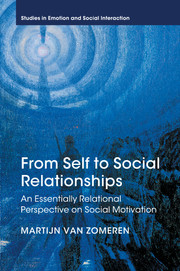Book contents
- From Self to Social Relationships
- Studies in Emotion and Social Interaction
- From Self to Social Relationships
- Copyright page
- Dedication
- Contents
- Figures
- Book part
- Prologue
- Part I Assumptions
- Part II Selvations theory
- Chapter 3 Selvations theory I: Value infusion
- Chapter 4 Selvations theory II: Coping with value-infused events
- Part III Implications
- Epilogue
- References
- Index
- Studies in Emotion and Social Interaction
Chapter 4 - Selvations theory II: Coping with value-infused events
from Part II - Selvations theory
Published online by Cambridge University Press: 05 May 2016
- From Self to Social Relationships
- Studies in Emotion and Social Interaction
- From Self to Social Relationships
- Copyright page
- Dedication
- Contents
- Figures
- Book part
- Prologue
- Part I Assumptions
- Part II Selvations theory
- Chapter 3 Selvations theory I: Value infusion
- Chapter 4 Selvations theory II: Coping with value-infused events
- Part III Implications
- Epilogue
- References
- Index
- Studies in Emotion and Social Interaction
Summary
- Type
- Chapter
- Information
- From Self to Social RelationshipsAn Essentially Relational Perspective on Social Motivation, pp. 93 - 118Publisher: Cambridge University PressPrint publication year: 2016



